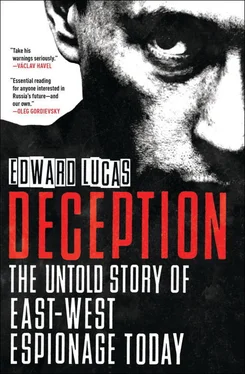As well as showing off and tying up scarce defence resources with military stunts, Russian efforts also involve spying on Britain’s nuclear deterrent. It is fashionable to deride this as a Cold War legacy. Those who want Britain to give it up should perhaps ask themselves why Russia spends so much energy trying to unpick its secrets. It is still quite possible to imagine a scenario in which America is unwilling to risk a nuclear confrontation with Russia over a security conflict in Europe. In the autumn of 2009, for example, Russia and Belarus conducted the Ladoga and Zapad-09 manoeuvres. 12This was in fact one exercise, but divided into two in order to avoid having, to invite observers from NATO, as stipulated by arms-control treaties for drills involving more than 13,000 soldiers. The real exercise was not defensive, but aggressive. The combined forces, some 20,000 strong, were rehearsing how to isolate the Baltic states from the rest of Europe, invade and occupy them. In case of reinforcement by other NATO countries, the rehearsal showed that Russia would respond by using tactical nuclear weapons. This drill was followed by another exercise by Russia’s Strategic Rocket Forces (the custodians of its main nuclear arsenal) in which the target was Warsaw, 13showing how closely Russia’s conventional defence planning is linked to the use of nuclear weapons – and how important the British nuclear deterrent remains. Imagine for example that America, facing a defence budget shrivelled by economic weakness, were preoccupied elsewhere, say in a confrontation with Iran that blocked oil supplies through the straits of Hormuz (which could easily be manufactured by Russia) or with China over Taiwan. A reminder from Britain that it has an independent nuclear deterrent and is prepared to use it in response to a Russian nuclear attack on any British forces in the Baltic could tip the balance between peace (meaning victory) and a conflict (which NATO, without America, would lose). Such a scenario is in current conditions extremely unlikely. But if that British response becomes impossible (for example because our deterrent is no longer credible) then the whole basis of Western defence weakens. If a future Russian leadership could assume it did not risk the ultimate penalty for military adventurism (and especially if NATO knew it too), then bullying neighbours, with the threat of armed force at least in the background, becomes more likely.
It is therefore interesting that Akula-class submarines, the pride of Russia’s dwindling navy, have resumed a Cold War-era tactic, lurking off the Forth of Clyde in the hope of picking up the acoustic signature of Britain’s Trident submarines as they enter and leave their base. This distinctive pattern of noise allows sophisticated detection equipment to track and potentially destroy the other side’s submarines. Once you know what you are looking for, it is much easier to find it. The Royal Navy’s Vanguard-class submarines now devote considerable time to fending off these attempts. Given the secrecy that traditionally surrounds anything to do with submarines, any public mention of such concerns is a sign of how seriously naval chiefs take the Russian activities. Whispers in the shadows of Whitehall suggest a still greater incidence of such activities, including the targeting of undersea anti-surveillance installations. Akula-class submarines are also patrolling far afield – even to the coasts of the United States, where one such vessel surfaced as if openly inviting attention. 14Russia’s aim is to intimidate and divide NATO, forcing the alliance to focus on hard questions that its members would rather avoid, and for which the various national publics have no appetite. If, after stirring up a divisive discussion in NATO, Russia concluded that Poland and the Baltic states were diplomatically and militarily isolated, it then would find it easier to bully them over other matters of concern such as energy supplies, trade or domestic politics. In assessing that scope for manoeuvre, intelligence plays a vital role.
Russia was most interested in the Western reaction to its exercises. What conclusions did military attachés draw? Could NATO tap Russian battlefield communications in real time? Most importantly, how did other countries respond to the quiet but sharply expressed concern from Tallinn, Riga, Vilnius and Warsaw? Was the West’s reaction to tell these frontline countries to calm down and be quiet? Or was it to offer them reassurance? In fact, the reaction was not what Russia expected. Though some officials tried hard to play down the significance of the exercises (one called them ‘a twitch of the dinosaur’s tail’), America ordered a response that included in 2010 a major special-forces exercise, a marine amphibious landing in Estonia and a reinforcement drill in Latvia, with more to follow. NATO warplanes held a large air exercise involving mid-air refuelling. America’s National Geospatial-Intelligence Agency (formerly the Defense Mapping Agency) has compiled a detailed 3D electronic map of the Baltics. NATO contingency plans now for the first time include the Baltic states, involving the use of Swedish airspace and Polish troops. This was presumably not what the Russians wanted. So why did they do it? The chief reason for this self-defeating gambit was a flawed assumption: that the West does not really care about the Baltic states and brought them into NATO only for political reasons. In fact, America at least has shown that it does care about its new allies and is willing to make efforts to prove it.
Monitoring all this closely was the spy-infested Russian mission to NATO. This quasi-diplomatic outfit enjoys a remarkably privileged status at alliance headquarters in Brussels, with regular briefings, spacious offices and security badges that allow its members preferential access to meetings, documents and other facilities. This friendly treatment dates from the days when NATO tried to soft-soap Russia about the alliance’s expansion to the former Soviet empire. By opening up to Russia, NATO hoped to dispel any fears about its intentions; belief persists among some member countries that differences with Russia are merely the result of misunderstandings, and that confrontation would be a sign of failure. This approach is heartfelt, particularly in Germany, where it is an article of faith among senior officials that Russia must be embraced and reassured, not deterred. The theoretical argument about whether relations would be even worse without this approach is unresolvable. What is clear is that attempts to build trust have proved unsuccessful in practical terms. On issues such as terrorism NATO puts cards on the table, and receives in return Russian offerings dressed up as serious intelligence, though in truth they are little more than could be found out on the internet. The Russian spies posted to the NATO mission are numerous, ubiquitous, unscrupulous and energetic. They bluntly and repeatedly approach officials whom they regard as promising targets. They are adept at keeping their distinctive ID badges concealed and slipping into meetings to which they have not been invited. Their chief targets are the alliance’s future military thinking, especially its contingency plans; new capabilities, for example in cyber-warfare or missile defence; and NATO’s codes and communications – the alliance’s central nervous system. They have a sharp eye on counter-intelligence: trying to find out what NATO members know about Russia, and where it comes from. They like to have a clear idea of who is being trained for what, by whom, where, and how well.
A paradox here, as so often in intelligence work, is that many of these secrets are both closely guarded and yet not very interesting. NATO’s abilities and capabilities have shrivelled since the end of the Cold War. Many of its members spend risibly little on defence. Many of the member states’ governments have little interest in Russia, and find it hard to share the worries of countries such as the Baltic states and Poland. In a crisis, NATO’s effectiveness depends almost wholly on the United States. Russian intelligence penetration of NATO probably peaked at a time when it revealed a lack of secrets, rather than their existence. Russia’s lavishly resourced spies do not mind about that. For a start, NATO HQ is a good place to recruit highfliers from the countries that matter – chiefly America, Britain, France, the Netherlands, Norway or Turkey – who will go on to careers in their national defence and security establishments. Secondly, Brussels is a great place for agent-running. Belgian counter-intelligence is weak. Only a handful of officers deal with Russia. They have no powers of arrest and face grave difficulties in obtaining warrants. All this is a serious problem for the hard-pressed NATO Office of Security.
Читать дальше












